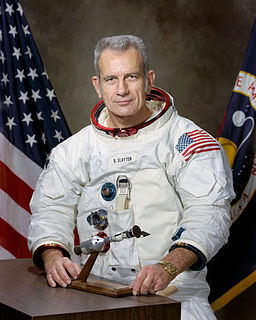A Quote by Stephen Hawking
In less than a hundred years, we have found a new way to think of ourselves. From sitting at the center of the universe, we now find ourselves orbiting an average-sized sun, which is just one of millions of stars in our own Milky Way galaxy.
Related Quotes
While the Copernican principle comes with no guarantees that it will forever guide us to cosmic truths, it's worked quite well so far: not only is Earth not in the center of the solar system, but the solar system is not in the center of the Milky Way galaxy, the Milky Way galaxy is not in the center of the universe, and it may come to pass that our universe is just one of many that comprise a multiverse. And in case you're one of those people who thinks that the edge may be a special place, we are not at the edge of anything either.
Science has an uncomfortable way of pushing human beings from center stage. In our prescientific stories, humans began as the focal point of Nature, living on an Earth that was the center of the universe. As the origins of the Earth and of mankind were investigated more carefully, it became clear that Nature had other interests beyond people, and the Earth was less central than previously hoped. Humankind was just one branch of the great family of life, and the Earth is a smallish planet orbiting an unexceptional sun quite far out on one arm of a run-of-the-mill spiral galaxy.
The central region of the Milky Way, known as the bulge, is stuffed with literally tens of billions of stars. And most of these are old - considerably older than our Sun or its neighbors - because this part of the galaxy formed first. Consequently, bulge stars are generally deficient in heavy elements.
Now, almost one hundred years later, it is difficult to fully appreciate how much our picture of the universe has changed in the span of a single human lifetime. As far as the scientific community in 1917 was concerned, the universe was static and eternal, and consisted of a one single galaxy, our Milky Way, surrounded by vast, infinite, dark, and empty space. This is, after all, what you would guess by looking up at the night sky with your eyes, or with a small telescope, and at the time there was little reason to suspect otherwise.
The human race is just a chemical scum on a moderate-sized planet, orbiting around a very average star in the outer suburb of one among a hundred billion galaxies. We are so insignificant that I can't believe the whole universe exists for our benefit. That would be like saying that you would disappear if I closed my eyes.
I feel that I'm in on the ground floor of something that human beings will be concentrating on for the next 1,000 years-if we don't destroy ourselves in the meantime. It's possible that 50 years from now we're going to end up out of this solar system, batting around the universe, at least within our galaxy, investigating other stars and other systems.































